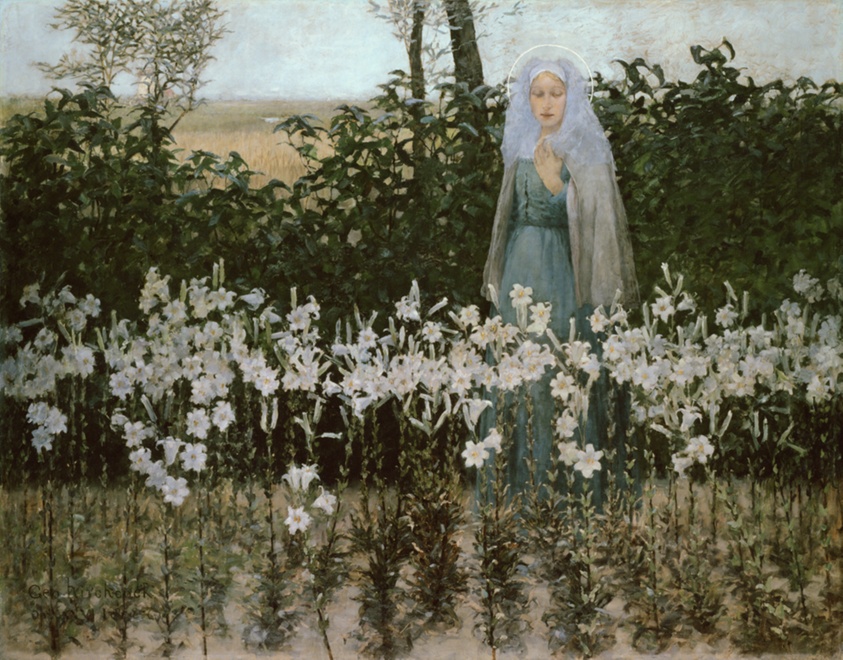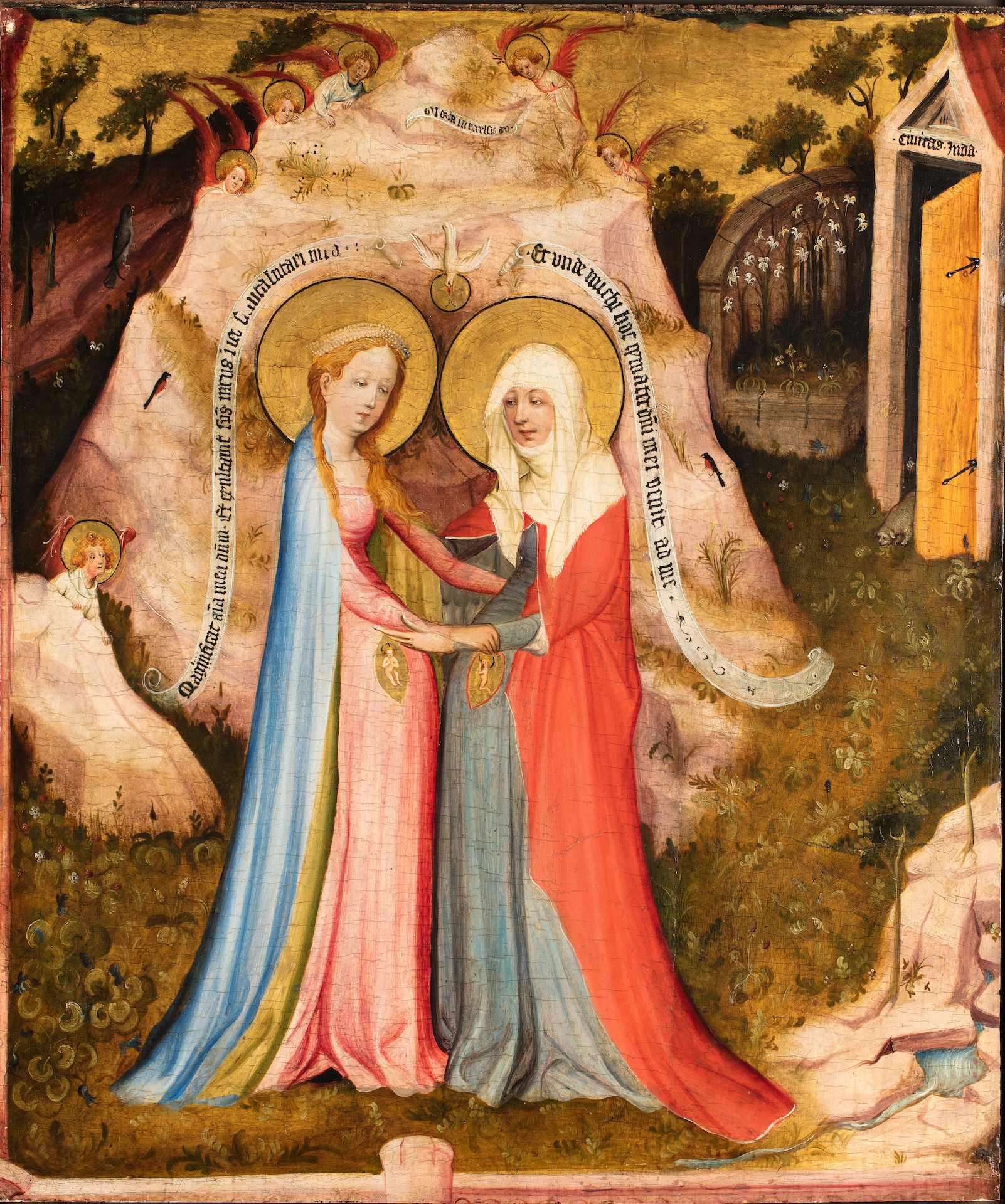The Advent Project: Week 2Näide

Dec. 10: Mary’s Exquisite Hymn of Praise

The Annunciation, George Hitchcock, 1887. Oil on canvas, 62.5 x 80.5 in. Chicago Art Institute, Chicago, Illinois. Public domain.

Altarpiece from the Middle Rhine. Visitation Panel, c. 1410. Tempera on panels. Museum Catharijneconvent, Utrecht, Netherlands. Public domain.
“A New Magnificat”on the album My Spirit Sings of Wondrous Things. Performed by The St. Olaf Choir, composed by Carolyn Jennings.
Poetry:
from “Annunciation”
by Denise Levertov
Aren’t there annunciations
of one sort or another
in most lives?
Some unwillingly
undertake great destinies,
enact them in sullen pride,
uncomprehending.
More often
those moments
when roads of light and storm
open from darkness in a man or woman,
are turned away from
in dread, in a wave of weakness, in despair
and with relief.
Ordinary lives continue.
God does not smite them.
But the gates close, the pathway vanishes.
SONG OF THE MATERNAL PROPHETS
In the garden of God’s emerging new creation, two roses meet: one just about to blossom, the other drooping in decline. Two relatives greet: one vulnerable through fruit implanted too soon, the other shamed by fertility past due. As had their mother Eve, Mary and Elizabeth participate in God’s creative project by collaboratively offering their bodies as seedbeds of new life. And like their spiritual ancestress, they prophetically recognize the significance of their maternity—with God’s help, they are fulfilling His promise not only to perpetuate life on the earth, but also to overturn all that threatens to destroy it. Two women—playing the part of prophet and priest–join together in celebrating the works of their King: past, present, and future.
Nothing about these women is ignorant, ashamed, or suppressed. Elizabeth lifts her voice in loud proclamation, channeling the priesthood of her ancestor Aaron as she blesses this yet-unrevealed mother-to-be and affirms her favored position among women. Without denigrating her husband’s weak faith, Elizabeth honors Mary’s strength in believing that God would do for her just as He had said. And taking up the refrain, Mary resonates her ancestor David’s poetic praise in a prophetic recitation of the mighty works of God, played out in global politics and local economics, public social status and private heart-posture, daily provision and eternal satisfaction. In Mary’s song, the purposes of God are revealed, the words of God are fulfilled, the kingdom of God is at hand. Mary sings like a queen as she invokes God’s covenant with Abraham, with Jacob, and with David in the history changing event she is now experiencing within her pregnant frame.
The affirmation of Elizabeth’s proclamation and the magnificence of Mary’s song open a new chapter on human history, one in which we now participate. The clarity of their vision and the confidence of their proclamation take my breath away. And yet Levertov’s insight into the annunciations which we misappropriate, avoid, or simply fail to notice leads me to wonder at our own preparedness to receive and respond to our Lord in the terrain of our pedestrian lives. Were God to unfold to us the next step in His kingdom progression, were He to invite our participation in His cosmic plan for creation—would we respond in kind? Would we have the clarity to recognize the day of His coming, the confidence to apply His past promises to our current experience, and the courage to sing our way forward into what may very well result in the piercing of our own hearts?
The politics of their day were no less volatile than ours; the vision of God’s purposes in the world no less obscured. Rulers vied for power. The oppressed cried out for justice. Zealots proposed revolutions. Religious leaders enforced traditions. Yet none of these could squelch the song of the Spirit, rising up on the lips of the faithful. Steady immersion in the Scriptures informed their vision. Psalms of lament, petition, and praise prepared their prayer. And faith-filled action moved them, one step at a time, to meet and greet at what would become ground zero of a new creation.
Prayer:
O you in whom we live and move and have our being, reign in us as You did in Mary and Elizabeth, granting us eyes that notice your hand in our history, hearts that believe your promises, lips that affirm your favor, and lives that act on your faithfulness. Grant that we, watching for your coming among us, may courageously participate in Your kingdom now, even as we wait for our future consummation through Christ our Lord.
Amen.
Tiffany Clark, M.A., I.C.S.
Lay Assistant Minister at Christ Church
Georgetown, Washington, D.C.
Author and Spiritual Director
For more information about the artwork, music, and poetry selected for this day, please visit our website via the link in our bio.
Pühakiri
About this Plan

Biola University's Center for Christianity, Culture & the Arts is pleased to share the annual Advent Project, a daily devotional series celebrating the beauty and meaning of the Advent season through art, music, poetry, prayer, Scripture, and written devotions. The project starts on the first day of Advent and continues through Epiphany. Our goal is to help individuals quiet their hearts and enter into a daily routine of worship and reflection during this meaningful but often hectic season. Our prayer is that the project will help ground you in the unsurpassable beauty, mystery, and miracle of the Word made flesh.
More
Related Plans

The Life of Jesus Pt. 5 – Multiplying Leaders

The Power of Thanksgiving

Advent Meditations

Chosen and Set Apart: Walking in Your God-Given Identity

At Thy Word With Reverend Matthew Watley

Thriving at Work

Following Jesus Through the First Christmas: 25 Days of Advent Truths

Rise and Write: Overcoming 3 Common Obstacles Christian Writers Face

His Name Shall Be Called
